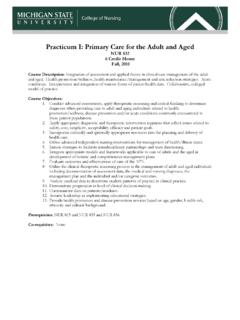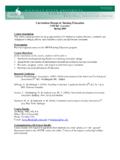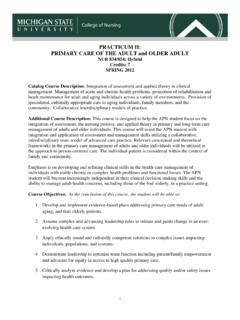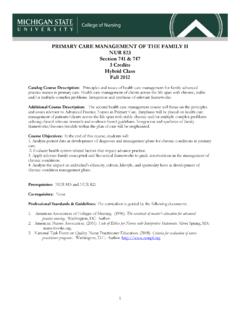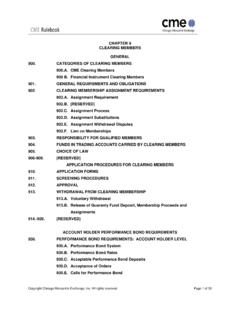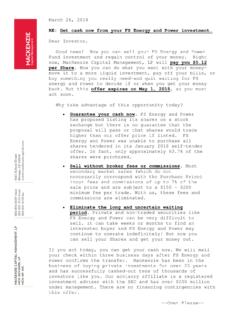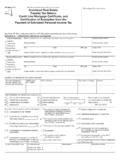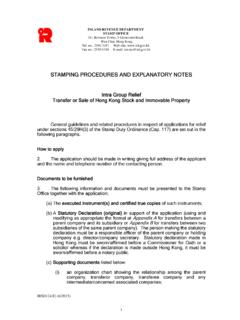Transcription of PATHOPHYSIOLOGY for the ADVANCED PRACTICE …
1 PATHOPHYSIOLOGY for the ADVANCED PRACTICE NURSE NUR 805 sections 731 - 737 3 Credits On-Line Format Summer 2012 Catalog Course Description: Alterations of various physiological systems. PATHOPHYSIOLOGY of frequently encountered primary care conditions across the life span and special populations. In-depth case analysis of risk factors, pathophysiological changes, and associated clusters of signs and symptoms. Pathophysiological theories and evidence-based research as a basis for ADVANCED PRACTICE nursing (APN). Additional Course Description: NUR 805 is a graduate level course offered totally in an on-line ANGEL format.
2 It is expected that the student already has sound foundational knowledge regarding anatomy, physiology, and basic PATHOPHYSIOLOGY . This knowledge should have been obtained through coursework as an undergraduate student and through providing hands-on nursing care in a variety of health care settings over a period of time. Course Objectives: at the end of this course, students will be able to: 1. Analyze the etiology and pathophysiological alterations associated with selected common primary care conditions across the life span. 2. Examine relevant theories and research as a basis for explaining the pathophysiological changes associated with common conditions in primary care.
3 3. Discuss the pathophysiological basis for development of clinical manifestations in selected common primary care conditions. 4. Discuss the issues/considerations associated with the pathophysiological changes in special populations. 5. Apply the pathophysiological principles to case situations as a basis for APN PRACTICE . Prerequisites: None Co-requisites: None Professional Standards & Guidelines: The curriculum is guided by the following documents: American Association of Colleges of Nursing. (2010). Adult-gerontology primary care nurse practitioner competencies.
4 Washington, DC: Author. American Association of Colleges of Nursing. (1996). The essentials of master s education for ADVANCED PRACTICE . Washington, DC: Author. American Nurses Association. (2010). Guide to the code of ethics for nurses with interpretive Statements. Silver Spring, MD: Author. National CNS Competency Task Force. (2008). Clinical nurse specialist core competencies: Executive summary 2006-2008. Philadelphia, PA: National Association of Clinical Nurse Specialists. 1 2 National League for Nursing.
5 (2004). The scope of PRACTICE for nurse educators. New York City, NY: Author. National Task Force on Quality Nurse Practitioner Education. (2008). Criteria for evaluation of nurse practitioner programs. Washington, DC: Author. Lead Faculty: Linda Keilman, DNP, GNP-BC Assistant Professor HP Gerontological Nurse Practitioner 517/355-3365 or Toll Free #: 1/800/605-6424 Life Sciences Building 1355 Bogue Street, Room A 126 Office hours or contact times are flexible & can be arranged! Required Textbooks: American Psychological Association. (2010). Publication manual of the American Psychological Association (6th ed.)
6 Washington, DC: Author. McCance, , Huether, , Brashers, , & Rote, (Eds.). (2010). PATHOPHYSIOLOGY : The biologic basis for diseases in adults and children (6th ed.). St. Louis, MO: Elsevier Mosby. Recommended Textbooks: McCance, , Huether, , Brashers, , & Rote, (Eds.). (2010). Study guide for PATHOPHYSIOLOGY : The biological basis for disease in adults and children (6th ed.). St. Louis, MO: Mosby Elsevier. (Some students find this workbook helpful & others do not up to you!) Optional Textbooks: Optional or recommended books are faculty suggestions for information that may help you help yourself in learning difficult material.
7 Recommended textbooks might be particularly of interest to those individuals having taken an undergraduate PATHOPHYSIOLOGY course more than 5 years ago. A lot has changed! See below! Lippincott Williams & Wilkins. (2009). PATHOPHYSIOLOGY made incredibly easy (4th ed.). Philadelphia, PA: Wolters Kluwer Health. Lippincott Williams & Wilkins. (2012). PATHOPHYSIOLOGY made incredibly visual (2nd ed.). Philadelphia, PA: Wolters Kluwer Health. Required Resources, References, Supplies: ANGEL Help Line (24 hrs, 7 days/week) (24 hrs, 7 days/week) Always check with the ANGEL Help Desk first!
8 Learning Methodologies: This online ANGEL course is built on a framework of material including: a lesson plan that includes the objectives, textbook readings, other required readings, key concepts and enrichment activities. During 3 some weeks, a summary/guidepost and brief introduction to the content are also provided but not required. This course is not based on a self-paced learning model. Although assignments may be completed at any time during the week they are due, ALL materials need to be posted by 2355 (11:55 pm Eastern Standard Daylight Savings Time [ESDST]) on Saturday evening of each week unless otherwise instructed by the faculty.
9 Any changes will be found in Course Announcements, posted at least weekly. Active participation throughout specific weeks is the expectation. Friday/Saturday only posts will not be eligible for full points as this is not considered engagement with classmates or faculty. As adult learners, it is expected that students will do relevant reading and study for the identified topics. As adult learners, it is also important that you read the rubrics in order to determine how your work will be evaluated. The expectation is that the student will be prepared to participate/engage in the discussion forums and do so throughout the week.
10 It is expected that students will search literature outside of the assigned textbook readings and suggest/share relevant findings with faculty and classmates. If faculties post a question, the expectation is that it will be answered. If faculties e-mail a student, it is expected that the student will respond that they have received the e-mail communication in a timely manner. It is imperative that the student understand normal structures and functions of the body learned in anatomy, physiology, and basic PATHOPHYSIOLOGY . If a number of years have passed since these types of courses were taken, it would be wise to review basic textbooks.

